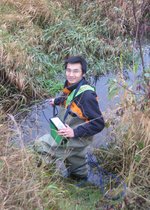
Global changes (including land use and climate changes) have particular threats to aquatic biodiversity. To mitigate the further decline of aquatic biodiversity and develop adaptive strategies, it is necessary to develop a novel interdisciplinary modelling approach (linking future scenarios, catchment habitat properties and ecological responses) to evaluate the impacts of land use and climate changes on aquatic ecosystems. Two Danish catchments (Gudenå 2600 km2, SkjernÅ 2300 km2) with solid long-term hydrologic and ecological data are selected to test the integrated models. The risk assessment system includes a dynamic DSSI/R approach (driver – stressor – state - impact/response), coupling the processed-based ecohydrological and biological models. Major drivers (land use and climate changes) are the model input data, and main stressors on ecosystems (water balance, flow regime, nutrients, sedimentation) are included in the algorithms of the hydrological model. Based on the multiple stressors, the dynamic changes of the states (hydrologic processes and habitat conditions) will be defined and displayed in the model outputs. The interactions between states and aquatic ecosystems will be evaluated by comparing the base and predicted biological models. This novel combination between hydrology and ecology will help to understand how multiple stressors interact with aquatic organisms and evaluate the potential risks of future land use and climate scenarios, which is essential for developing adaptive strategies for aquatic ecosystems and future environmental policy.
Project title:
Developing a risk assessment system to evaluate the impacts of future land use and climate scenarios on aquatic ecosystems - an interdisciplinary model-based synthesis
Area of research:
Aquatic biodiversity
Fellowship period:
1 Feb 2016 – 31 Jan 2019
Fellowship type:
AIAS-COFUND Marie Skłodowska-Curie fellow

This fellowship has received funding from the European Union’s Seventh Framework Programme for research, technological development and demonstration under the Marie Skłodowska-Curie grant agreement No 609033 and The Aarhus University Research Foundation.
